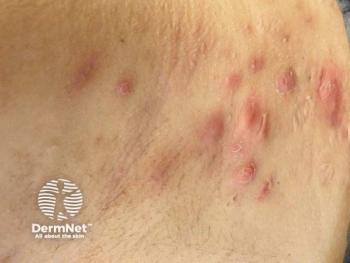
New Algorithm Proposes Targeted Lipase Monitoring for Pancreatic Adverse Events In Melanoma
Key Takeaways
- ICIPI is a rare adverse effect in melanoma treatment, with an incidence rate of 0.5% to 3%, potentially leading to severe complications if undiagnosed.
- Combination therapy with ipilimumab and nivolumab showed the highest incidence of lipase elevation, with 49.5% of patients affected.
Researchers recommend limiting routine lipase tests to symptomatic patients or those with radiographic signs of pancreatic injury.
A recent international, multicenter
The study, involving 1,516 patients across multiple centers in Austria and Switzerland, provides insights into the incidence, management, and outcomes of ICIPI. Despite its low occurrence rate (0.5% to 3%), the condition can lead to complications, such as pancreatic insufficiency, particularly when undiagnosed in asymptomatic patients.2
Background and Methods
Immune checkpoint inhibitors, including anti-PD-1, anti-PD-L1, and anti-CTLA-4 antibodies, are considered mainstay therapies in melanoma due to their potential to achieve long-term remission.3 However, their efficacy comes with immune-related adverse events, including ICIPI. This condition can present as acute or chronic pancreatitis, ranging from asymptomatic lipase elevations to severe symptoms like abdominal pain, jaundice, and diarrhea.
The study aimed to clarify the clinical course and real-life management of ICIPI by retrospectively analyzing data from 1,516 patients treated with ICIs from 2017 to 2020. Inclusion criteria required documented lipase elevation of 1.5 to 2 times the upper limit of normal or greater, with or without symptoms, post-ICI therapy initiation.
Findings
Among the study cohort, 350 patients (23.1%) exhibited some degree of serum lipase elevation, with 204 (13.5%) meeting the threshold for further analysis. The combination therapy of ipilimumab and nivolumab was associated with the highest incidence of lipase elevation (49.5%).
Of these 204 patients, 20.1% experienced symptoms consistent with pancreatitis, while 79.9% remained asymptomatic despite elevated lipase levels. Severe lipase elevations were observed in 44.1% of patients, with symptomatic cases more likely linked to severe grades.
Treatment interruption or discontinuation occurred in 45.1% of patients with significant lipase elevation, with corticosteroids prescribed to 50.5% of the cohort. The initial dose of steroids averaged 88.5 mg of prednisolone-equivalent. While corticosteroid treatment normalized lipase levels, it did not significantly expedite the process compared to patients who did not receive steroids. Eight patients required infliximab for steroid-refractory ICIPI.
No cases of long-term pancreatic insufficiency or fatal outcomes related to ICIPI were documented, suggesting that despite its severity, ICIPI can often be managed effectively.
Management and diagnostic approaches for ICIPI were heterogeneous among the participating centers, except in cases of symptomatic ICIPI, where there was consensus on the use of radiographic imaging regardless of CTCAE grading. However, practices diverged significantly for asymptomatic CTCAE II° and III° elevations, ranging from therapy continuation to temporary interruption. Glucocorticoid use was also inconsistent, with a consensus on administration only in CTCAE III° and IV° cases.
Despite guideline recommendations, many centers routinely conducted imaging in asymptomatic patients, leading to potential overuse of these diagnostic procedures.
Based on these findings, the authors proposed a management algorithm to standardize practices. This algorithm emphasizes selective lipase monitoring, limited imaging to cases with significant clinical suspicion, and cautious use of systemic steroids, particularly in symptomatic or radiographically confirmed pancreatitis.
Conclusions
While symptomatic cases were more likely to experience severe lipase elevations, a significant proportion of patients with asymptomatic lipase elevation required intervention.
The findings underscore the importance of routine pancreatic enzyme monitoring, particularly for patients on combination ICI therapy. However, the study also revealed limitations, including the retrospective design, reliance on electronic medical records, and variability in management practices across centers.
"Further studies will be necessary to elucidate the underlying pathologic processes leading to asymptomatic (or sub-clinical) elevation of pancreatic and other serum enzymes—such as creatine kinase or troponin T—during immune checkpoint inhibition, potentially allowing for a more accurate judgement of their relevance in routine clinical practice," wrote study authors Brandlmaier et al.
References
- Brandlmaier M, Hoellwerth M, Silly T. Immune checkpoint inhibitor-induced pancreatic enzyme elevation in melanoma patients: incidence, management and therapy—a multicentre analysis. J Eur Acad Dermatol Venereol. November 20, 2024.
https://doi.org/10.1111/jdv.20384 - Weber JS, D'Angelo SP, Minor D, Hodi FS, Gutzmer R, Neyns B, et al. Nivolumab versus chemotherapy in patients with advanced melanoma who progressed after anti-CTLA-4 treatment (CheckMate 037): a randomised, controlled, open-label, phase 3 trial. Lancet Oncol. 2015; 16: 375–384.
https://doi.org/10.1016/S1470-2045(15)70076-8 - Perez L, Samlowski W, Lopez-Flores R. Outcome of elective checkpoint inhibitor discontinuation in patients with metastatic melanoma who achieved a complete remission: real-world data. Biomedicines. 2022;10(5):1144. Published 2022 May 16.
doi:10.3390/biomedicines10051144
Newsletter
Like what you’re reading? Subscribe to Dermatology Times for weekly updates on therapies, innovations, and real-world practice tips.










